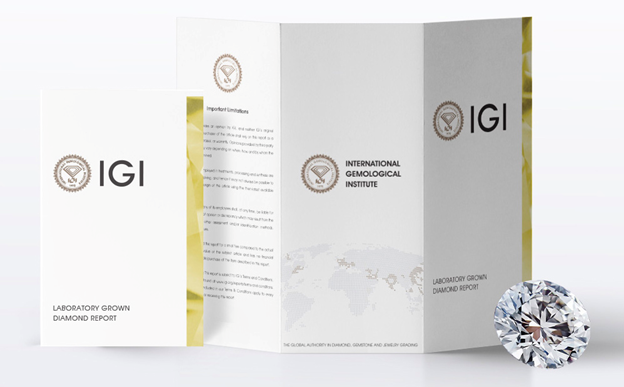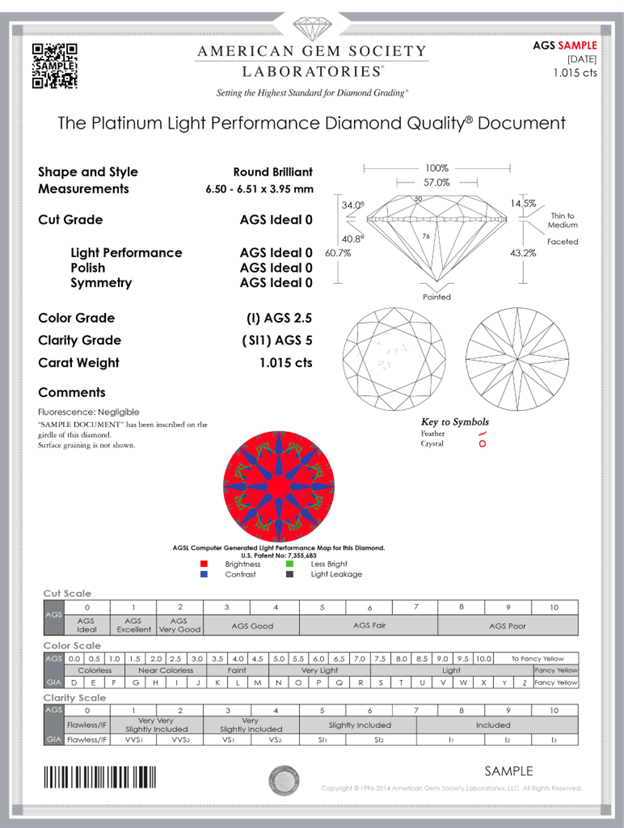This article has mentions of products from one or more companies, and I may receive compensation if you purchase those products following reading my recommendations.
Diamond certification is where gemstones have been graded by a reputable gem lab on the basis of their Four C attributes, which are Cut, Carat, Color, and Clarity. These diamonds have undergone quality analysis by a trusted gemological lab, such as GIA or AGS, and have been issued a lab report, which is commonly referred to as a “certificate” or “report”.
The most popular gem labs serve as an independent authority on the quality and identity of diamonds and are not directly involved in the transaction. Non-certified diamonds are pretty commonly available in the market and are simply those diamonds that have not gone through any kind of official lab grading.
So why is diamond certification so important?
- A Short Guide to Diamond Certification
- What to Look for in Diamond Certification
- GIA Certification
- AGS Certification
- Buying Certified Diamonds vs. Non-Certified Diamonds
- Diamond Certification vs. Diamond Appraisal
- Additional Considerations Regarding Diamond Certification
A Short Guide to Diamond Certification

GIA Diamond Certificate
Diamond certifications provide reports to both buyers and sellers regarding the grades of each diamonds. Not only does this information prove the quality of the diamond, it also directly influences the price. Upon every purchase (or sale), the diamond certification should be reviewed, as this is the documentation that has been given by trained professionals using technical equipment.
Unfortunately, not all diamond certifications are equal. Some organizations have a history of inflating the quality of the diamonds they grade. Fortunately, they’re are two organizations you can trust—the AGS and the GIA.
What to Look for in Diamond Certification
The main thing you need to look for in diamond certification? Consistency.
In terms of consistency, the GIA and the AGS are incredibly qualified and two of the most respected labs in the world.
For lab diamonds the IGI is the leading institute, consisting of 20 labs around the world, and 14 gemology schools.

IGI Diamond Certificate
They provide a wide variety of services including hearts and arrows grading and appraisal valuation.
GIA Certification
The GIA is potentially the most well-known and well-respected diamond lab in existence. They are known for being very rigorous when it comes to clarity and color.
The GIA has no financial stake in inflating diamond grading scores, and so can be trusted to be impartial within the grading process.
AGS Certification
The AGS is one of the longest-operating gem labs in the world, and previously had the monopoly on grading the best diamonds on the market. However, today, you will probably find that there are no discernible differences between the AGS and the GIA.

Learn more about the AGS and the GIA here.
Buying Certified Diamonds vs. Non-Certified Diamonds
Not all diamonds need to be graded by a gem lab. Lab reports on inexpensive or small diamonds offer insignificant benefits to the buyer while adding considerably to the cost (usually under 0.3 carats).
For diamonds of this size, however, make sure you are buying from a reputable dealer that certifies all their larger diamonds. The best online retailers that I would recommend are Whiteflash (for round and princess cut diamonds), James Allen (for fancy shapes) and Leibish and Co (for colored diamonds).
Where to Find the Best Diamonds Online
Are you here because you’re looking to purchase a diamond, but you’re not sure where to go or what to look for? We’ve all been in that situation before. The trick is doing your research before you make a commitment.
And the best place to start that research? Right here. I always give three recommendations when anyone asks me where to purchase diamonds online—Whiteflash, James Allen, and Blue Nile.
Head to my diamond review section to discover my exact thoughts on why these three diamond retailers are leading the online diamond market.
Diamond Certificate vs. Diamond Appraisal
Keep in mind that a diamond appraisal and diamond certification are not the same thing since there are some retailers who will attempt to pass off a diamond appraisal as a diamond certificate.
A diamond appraisal is usually prepared by the diamond seller to denote the approximated worth for the purpose of insurance. A diamond certificate, on the other hand, is a third-party, unbiased assessment of the gemstone’s quality arranged by a certified gem lab.
Additional Considerations Regarding Diamond Certification
Since practically any diamond can be sent to a laboratory for a grading report, the sheer fact that it is a certified diamond does not automatically mean that it is anything specifically special. The grading data contained in the report will act as proof of whether or not the diamond is commercial grade, gem grade, or a grade below.
Conversely, just because a diamond is not certified does not necessarily imply that it is somehow undesirable or of poor quality. Some diamond jewelers and dealers typically like to forgo the expenditure of a lab report to be able to sell the gem at an affordable rate—however, I would avoid them at all costs unless you are an expert.
This is particularly true with more commonplace commercial quality diamonds in medium to small sizes. High-quality diamonds in bigger sizes are often sent to the gem lab before they are even placed on the market.
Regardless of which diamond you may be considering, it is suggested that you only deal with a reputable diamond expert and on top of that only invest in certified diamonds.
Is Diamond Certification Important?
Diamond certification is potentially the most important thing during a purchase, only after the diamond itself. Without a trustworthy certificate, you cannot trust that the diamond you’re buying is exactly as described. When you’re looking for a specific diamond clarity, consult the certification. The same goes for color, carat weight, and cut.
My Final Recommendations
If you’re purchasing a diamond soon, I would recommend choosing one with either GIA or AGS certification, as these are world-renowned gem labs known for their consistency. On top of this, choose a diamond retailer that exclusively deals in diamonds that are certified by either AGS or GIA gem labs, such as Whiteflash, James Allen, or Blue Nile.
Do make sure you read my posts on GIA and AGS certification and the importance of how to read a diamond certificate.
